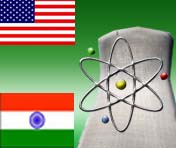Indian government ready to push nuclear deal on world stage
 New Delhi - A day after it won parliament's endorsement for a controversial nuclear agreement with the United States, India's United Progressive Alliance (UPA) government on Wednesday readied to woo international opinion in favour of the pact.
New Delhi - A day after it won parliament's endorsement for a controversial nuclear agreement with the United States, India's United Progressive Alliance (UPA) government on Wednesday readied to woo international opinion in favour of the pact.
The deal would allow the US to export nuclear materials and technology to India ending a three-decade ban while India would open its civilian reactors to international inspection.
India is also hoping that the deal will pave the way for wider international nuclear cooperation, ending years of isolation following its nuclear tests in 1974 and 1998 and refusal to sign the Nuclear Non-Proliferation Treaty (NPT).
But before the deal with the US can be made operational, India has to reach a country-specific safeguards agreement with the International Atomic Energy Agency (IAEA) and get the Nuclear Suppliers Group to change its rules allowing trade with a non-signatory to the NPT. The 45-member NSG controls global trade in fissile materials.
The Indian government plans to send at least three federal ministers and top-ranking envoys with decades of experience in international diplomacy on the "charm NSG" mission, IANS news agency reported, quoting official sources.
The officials would focus on countries with a strong non-proliferation agenda like Ireland, Austria and Norway and those like China which are non-committal.
Prime Minister Manmohan Singh's special envoy and former foreign secretary Shyam Saran left for Irish capital Dublin within hours of the government winning the trust vote late on Tuesday.
Ireland is a member of the IAEA board of governors as well as the NSG and has a hawkish position on non-proliferation issues. At least 20 countries are members of both the IAEA and the NSG.
The IAEA's board of governors is scheduled to meet in Vienna on August 1 to consider the draft of an India-specific safeguards agreement.
Indian officials expect a quick and positive decision by the IAEA though its South Asian rival Pakistan, a member of the IAEA board, has already raised objections to the proposed safeguards agreement. India is also a member of the IAEA board.
Officials are not as sanguine about the NSG where it has to get a waiver by consensus. The country representatives would have to go back to consult their governments and some may need to go through internal procedures. India is not represented in the NSG, but the US is expected to do intense lobbying for a waiver.
Welcoming the support in the Indian Parliament for the India-US nuclear cooperation agreement, the US Ambassador to India David C Mulford said in a statement: "We will work closely with the government of India in days ahead for rapid completion of the ratification process through IAEA, Nuclear Suppliers Group and US Congress."
Both the IAEA safeguards pact and the NSG waiver have to be in place for US President Bush to determine that all obligations under the 123 agreement have been fulfilled by India and the US after which he is expected to place it before the US Congress.
Singh and Bush first agreed in principle to the civilian nuclear cooperation deal in July 2005. Indian and US officials who have been steering the deal over the past three years are hoping to see it through before Bush's term comes to an end. The US presidential election is scheduled for November.
India's junior minister for external affairs, Anand Sharma, is expected to travel to South Africa, an NSG member, later this week to lobby for support. He is already meeting ministers from Australia and New Zealand on the sidelines of the ASEAN Regional Forum ministerial meeting in Singapore.
Science and Technology Minister Kapil Sibal, Minister of State in Prime Minister's Office Prithviraj Chavan, National Security Adviser MK Narayanan and Prime Minister's Special Envoy to Middle East Chinmaya Gharekhan are among those who will travel to various NSG countries, IANS reported.
Foreign Secretary Shivshankar Menon is expected to leave for Washington soon to coordinate details and strategy with US officials. (dpa)